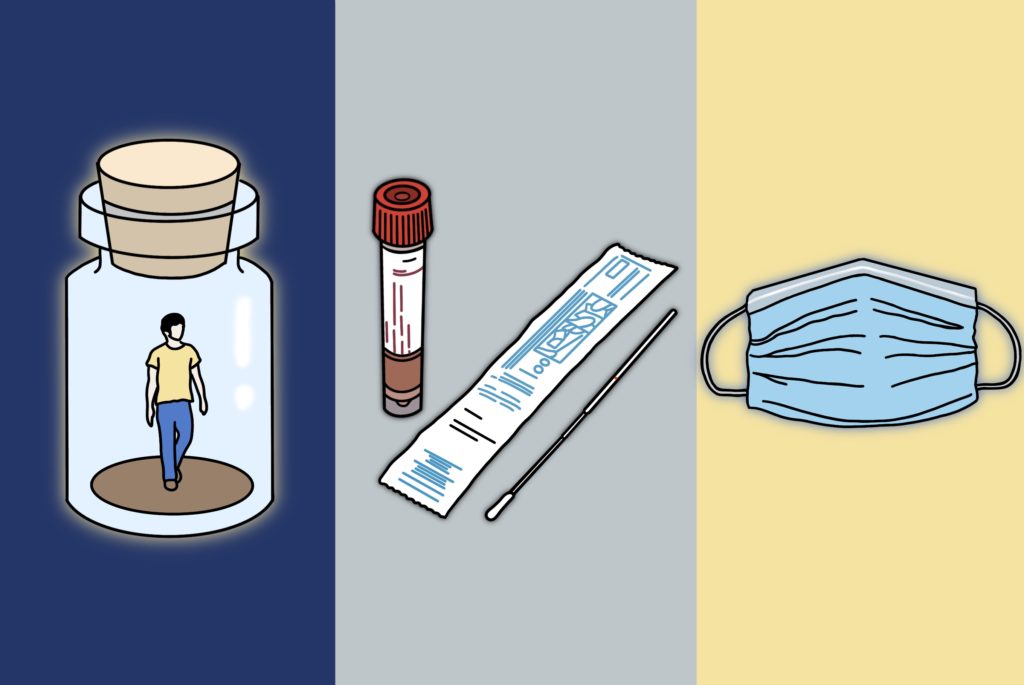
Graphic by Yoyo Zhang/The Choate News
As daily Covid-19 cases in Connecticut reach their highest numbers since June, the School has made changes to its initial mitigation strategies to meet the challenges of the state’s increased infection rates.
Many of the guidelines from when students first arrived on campus remain in place. These include wearing masks on campus except in one’s own dorm room, social distancing from others in all public spaces, frequent hand washing, and weekly testing. If a student feels unwell, they must seek medical assistance from the Health Center and self-isolate in their room in the meantime. The School has been utilizing filtration strategies such as high efficiency particulate air (HEPA) filters to aid with air circulation in all campus buildings.
However, rising Covid-19 infection rates in certain Connecticut towns have forced the School to reevaluate procedures surrounding day students who could put the community at risk. Although boarders continue to operate in a controlled and monitored environment, day students, faculty, and staff, who are in contact with family members and other people residing outside of Choate’s immediate campus, are more susceptible to infection. Hence, these members are now required to take three Covid-19 tests per week, twice using a saliva test and once using a nasal test.
Dr. Miriam Cohen, the School’s Medical Director, said, “The saliva test is pretty much exactly the same as what we are doing with the nasal swab. It’s a PCR [polymerase chain reaction] test, but what’s different with saliva testing is that [they] are able to actually group samples together, so it’s called pooled saliva testing. They take a tiny bit out from 24 different vials … they combine it and run one PCR test on those 24 students or faculty or staff.” This method of testing has been utilized by many countries since spring but has only been made available in the United States last month.
Dr. Cohen explained that a negative PCR test is an efficient way to know if the group of 24 individuals are negative. If the test is positive, the 24 individuals are split into two groups, and the test is re-run.
On October 30, Dr. Cohen announced that members of the community who reside in towns with a rate of ten or more cases per 100,000 people but have a seven-day positivity rate below five percent — including Durham, New Haven, North Haven, and Wallingford — are now required to quarantine while at home if they wish to attend classes in-person, or switch to remote learning instead. Quarantine includes wearing a mask at home and remaining social-distanced from family members. Students from Bridgeport, Southport, and Stratford — towns with over ten cases per day and a positivity rate of over 5% — were required to learn remotely beginning November 2.
On November 6, the guidelines for day students grew even stricter: in her weekly Covid-19 update email, Dr. Cohen announced that all day students living in Fairfield County must now learn remotely while students from Branford, Cheshire, Middlefield, Orange, Southbury, and Southington were added to the list of those who are required to either learn remotely or quarantine while at home. These recent changes were implemented this Monday.
Day student Mirielle Ma ’21, who lives in Glastonbury, said, “As day students, we have to be really careful about going out in public and even interacting with our family, which can be a bit stressful. At least for me, being on campus and attending in-person classes is worth the extra precautions.”
Every decision to make Choate “safe and sounder,” as the School’s public-service campaign puts it, has gone through a long and elaborate deliberation process.
Dr. Cohen said, “I have discussed this with experts at Yale who are public health Ph.D.s, that are infectious disease MDs, that are epidemiologists, to ask their opinion on different ways that we can make our campus safe.”
Although more stringent measures have been established, there remains some apprehension about the effectiveness of these measures.
Day student David Garsten ’23, who lives in North Haven, said, “Based on people I’ve talked to, most people faced with a choice of stay home or quarantine from their parents will just choose quarantine from their parents and then not actually do it.”
The Covid-19 task force at Choate consists of a group of faculty and staff who showed interest in working on the necessary strategies to keep Choate safe, including several administrators, and those in oversight positions at Choate. The Adult and Student Health Safety Committee, which was created this summer in response to the pandemic, was also consulted in the planning process of these new policies.
In response to safety measures implemented, Spanish teacher Ms. Nancy Burress, who is a non-residential adviser in Archbold, said, “I suspect that the mitigation measures may feel odd and uncomfortable to students who are used to having more freedom. The threat that Covid-19 poses to all of us is so significant, though, that I hope and expect that students recognize that these new measures are necessary for now.”
Despite the challenges presented by Covid-19, members of the Choate community have been working hard to maintain good health and safety. Dr. Cohen concluded, “The numbers are rising around us, and, fortunately, we are not seeing numbers rise within our Choate community, so just a big thank you to everybody.”


